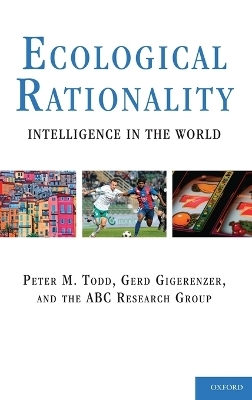
Ecological Rationality
Oxford University Press Inc (Verlag)
978-0-19-531544-8 (ISBN)
Peter M. Todd is Professor of Cognitive Science, Informatics, and Psychology at Indiana University. Gerd Gigerenzer is the Director of the Max Planck Institute for Human Development and Center for Adaptive Behavior and Cognition.
Part I. The Research Agenda ; 1. What Is Ecological Rationality? ; Peter M. Todd and Gerd Gigerenzer ; Part II. Uncertainty in the World ; 2. How Heuristics Handle Uncertainty ; Henry Brighton and Gerd Gigerenzer ; 3. When Simple Is Hard to Accept ; Robin M. Hogarth ; 4. Rethinking Cognitive Biases as Environmental Consequences ; Gerd Gigerenzer, Klaus Fiedler, and Henrik Olsson ; Part III. Correlations Between Recognition and the World ; 5. When is the Recognition Heuristic an Adaptive Tool? ; Thorsten Pachur, Peter M. Todd, Gerd Gigerenzer, Lael J. Schooler, and Daniel G. Goldstein ; 6. How Smart Forgetting Helps Heuristic Inference ; Lael J. Schooler, Ralph Hertwig, and Stefan M. Herzog ; 7. How Groups Use Partial Ignorance to Make Good Decisions ; Konstantinos V. Katsikopoulos and Torsten Reimer ; Part IV. Redundancy and Variability in the World ; 8. Redundancy: Environment Structure That Simple Heuristics Can Exploit ; Jorg Rieskamp and Anja Dieckmann ; 9. The Quest for Take-The-Best: Insights and Outlooks from Experimental Research Arndt Broder ; 10. Efficient Cognition Through Limited Search ; Gerd Gigerenzer, Anja Dieckmann, and Wolfgang Gaissmaier ; 11. Simple Rules for Ordering Cues in One-Reason Decision Making ; Anja Dieckmann and Peter M. Todd ; Part V. Rarity and Skewness in the World ; 12. Why Rare Things Are Precious: How Rarity Benefits Inference ; Craig R. M. McKenzie and Valerie M. Chase ; 13. Ecological Rationality for Teams and Committees: Heuristics in Group Decision Making ; Torsten Reimer and Ulrich Hoffrage ; 14. Naive, Fast, and, Frugal Trees for Classification ; Laura F. Martignon, Konstantinos V. Katsikopoulos, and Jan K. Woike ; 15. How Estimation Can Benefit From an Imbalanced World ; Ralph Hertwig, Ulrich Hoffrage, and Rudiger Sparr ; Part VI. Designing the World ; 16. Designed to Fit Minds: Institutions and Ecological Rationality ; Will M. Bennis, Konstantinos V. Katsikopoulos, Daniel G. Goldstein, Anja Dieckmann, and Nathan Berg ; 17. Designing Risk Communication in Health ; Stephanie Kurzenhauser and Ulrich Hoffrage ; 18. Car Parking as a Game Between Simple Heuristics ; John M. C. Hutchinson, Carola Fanselow, and Peter M. Todd ; Part VII. Afterword ; 19. Ecological Rationality: The Normative Study of Heuristics ; Gerd Gigerenzer and Peter M. Todd
| Erscheint lt. Verlag | 3.5.2012 |
|---|---|
| Zusatzinfo | 20 halftones, 70 line illus. |
| Verlagsort | New York |
| Sprache | englisch |
| Maße | 164 x 242 mm |
| Gewicht | 946 g |
| Themenwelt | Geisteswissenschaften ► Psychologie ► Allgemeine Psychologie |
| Geisteswissenschaften ► Psychologie ► Verhaltenstherapie | |
| ISBN-10 | 0-19-531544-8 / 0195315448 |
| ISBN-13 | 978-0-19-531544-8 / 9780195315448 |
| Zustand | Neuware |
| Haben Sie eine Frage zum Produkt? |
aus dem Bereich


